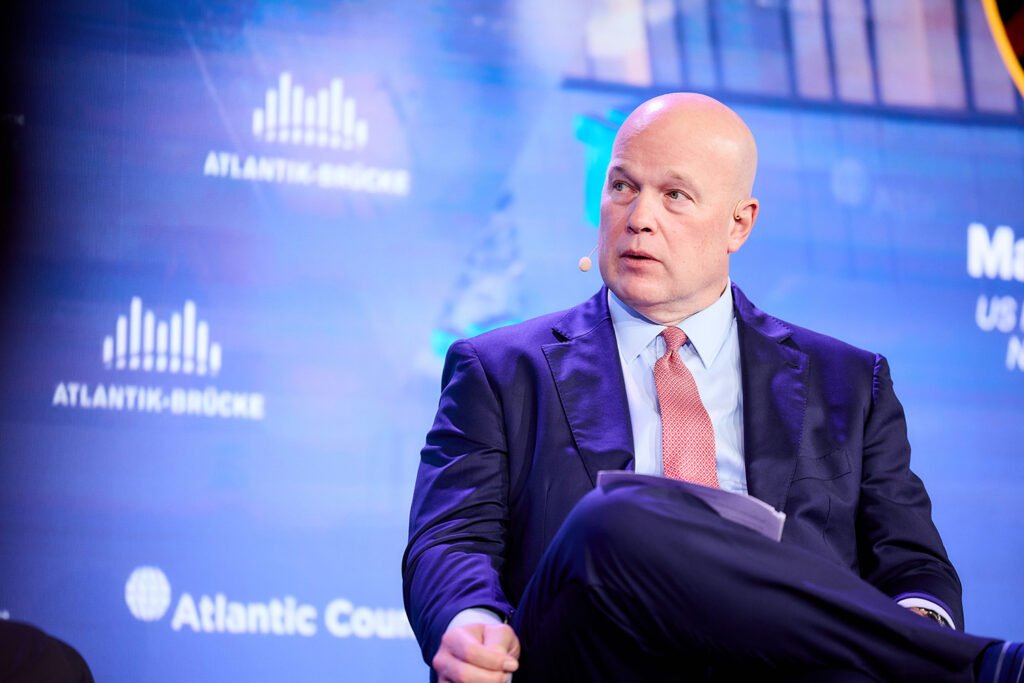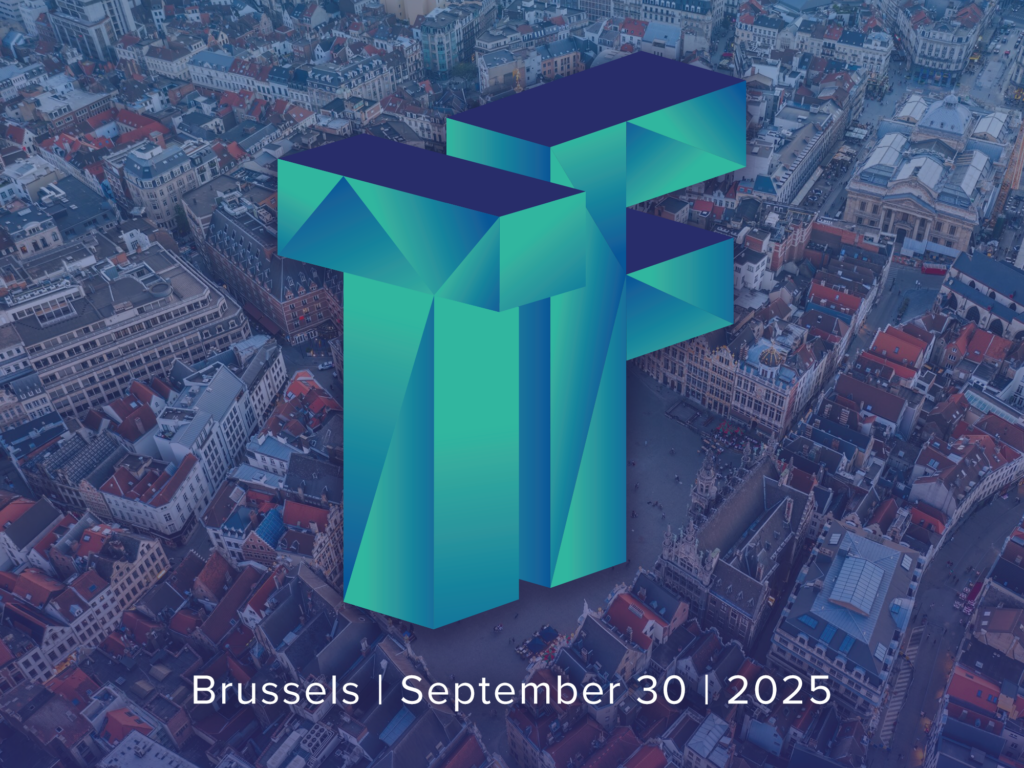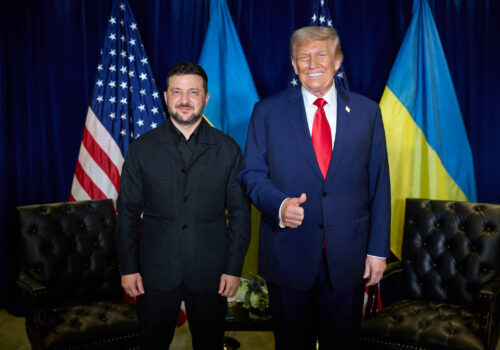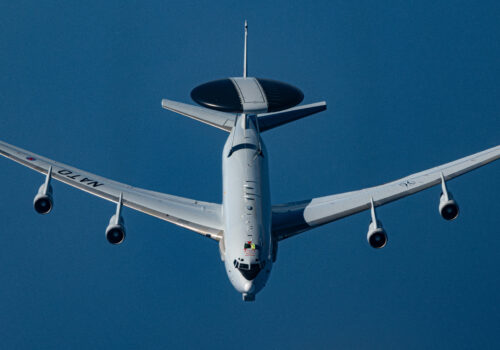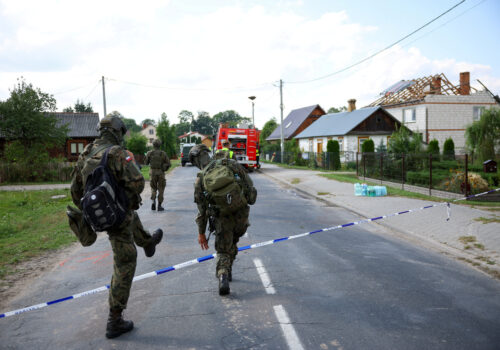Watch the event
Event transcript
Uncorrected transcript: Check against delivery
MATTHEW WHITAKER: Good morning, Fred.
FREDERICK KEMPE: Good morning, Ambassador. How are you?
MATTHEW WHITAKER: Well, they said a fireside chat. There’s no fire, so I’m a little disappointed.
FREDERICK KEMPE: I always take that out of my notes because a fireside chat is a—you know, it’s until we get to December, January, February I think we don’t need that.
But what a pleasure to start the day with you—Matthew Whitaker, the United States permanent representative to NATO. And you got off to what I would say is just a tremendous start with the summit in The Hague: A 5 percent defense commitment from all the allies. Nobody could have imagined that: 3.5 percent core, 1.5 percent beyond that. It’s great to have you here kicking us off.
As Julia said, we always put together the notion that you cannot separate security and you can’t separate prosperity. And so one of the questions behind this that we’ll talk about during the course of the day is Europe can’t afford not to pay for its own defense, but cannot afford to pay for its own defense. That’s one question.
But let’s start a little bit with a very brief introduction. We don’t have much time, so I don’t want to go through your entire CV. But Ambassador Whitaker has been President Trump’s envoy to NATO since April. As I said, he’s already made his mark in the summit in June. Most notably from that summit, the ambassador himself labeled it one of the most consequential moments in this alliance’s history. And it could be that if this could now be delivered on.
So maybe that’s where I’ll start. You’ve got threats to Europe’s security becoming frequent and dangerous. Just this month, Russia violated airspace—Poland, Romania, Estonia. This week’s Russian attacks on Ukraine are some of the fiercest we’ve had since the war began in February 2022. What are you looking at? In this context, with the decisions made in the NATO summit, how are you going to measure success? How are you going to see if everything that people have agreed to is actually producing real results?
MATTHEW WHITAKER: Yeah, great question. And thanks, Fred. I appreciate the invitation and, obviously, we could speak probably for all morning on the topics that right now we’re dealing with at NATO. And I want to appreciate, you know, your Atlantic Council, your Europe Center, and Atlantik-Brücke for hosting this important forum. The topics are very timely, and appropriate to be here in Brussels.
You know, the United States, as I say everywhere I go, remains committed to NATO and to defending every inch of NATO territory. But there are still issues to address, including the big one, defense spending, and obviously the resolution of the war in Ukraine. The United States expects European NATO allies to meet their defense commitments and the spending target of 5 percent, which you mentioned is 3.5 percent on NATO capability targets and another 1.5 percent on defense-related spending like enablement, dual-purpose infrastructure, and the like.
And these investments I think really get to the heart of the capabilities, security, stability, and quite frankly the credibility of NATO. When allies contribute their fair share towards the conventional defense of Europe, we strengthen deterrence and allow the United States to prioritize its own strategic resources while reinforcing regional and global security. And the Hague defense commitment was a good start, but unfortunately I think some of our allies are dragging their feet, and they need to pick up the pace. And you know, we need real year-over-year growth in every country’s defense spending, not just some defense spending in countries.
If every ally lives up to their Article 3 obligation, which says they will invest in their individual and therefore the collective defense, we’ll drive innovation and modernization across the alliance—two big things that I’m working on on a daily basis—and ensure that our forces are prepared for the evolving threats that we see changing every day, whether it’s in cyber, space, and really across all domains. And shared investment and collective defense investment in modern, interoperable forces—another keyword here in Europe, because there is still not 100 percent interoperability among all of our armed forces—will ensure that Europe and the United States can work seamlessly together. It strengthens our collective security, balances burden-sharing, and builds a credible deterrent that protects both European and American citizens, and Canadian citizens.
In an uncertain world, we can only have peace through strength. And this—I talk about this so much, Fred, how the strength of NATO, and if all thirty-two allies—if the whole team is strong and there’s no weak link, then that strength is what’s going to ensure peace and no one will challenge that strength.
And we all know that Russia is the greatest threat to peace in the transatlantic area. And if allies are serious about bringing peace to Ukraine, they need to starve the Russian war machine and stop purchasing Russian energy. Once they do that, obviously, there’s a clear path to additional US and European sanctions to impose even more costs and change the calculation for the Russians to come to the negotiating table and resolve this completely unnecessary and just meat-grinder of a war. And quite frankly, the ball is in the court of the European and Canadian allies. They need to start—every single ally needs to start spending money on their defense and stop buying Russian energy.
And you know, this conversation is something I’ve been looking forward to, Fred, for—since it got on my calendar, and I really appreciate the time. But I just want to emphasize that we are—everyone made the commitment in The Hague. Everyone knows 5 percent is our North Star. Everyone knows that every year we have to get year-over-year growth. And the challenge now is to make sure that everyone is moving at pace to the—at the speed of relevance to make sure that we can meet these commitments and, therefore, have that strength that’s going to guarantee the peace.
FREDERICK KEMPE: Thank you, Ambassador.
So let me come back to the defense spending and sort of the challenge for Europe. But let me first hit on something in your—in your opening comment, which is a clear path to sanctions; stop purchasing Russian energy. There’s a NATO bill—sorry, sanctions bill in the Senate, I think eighty-four Senate sponsors, waiting to go through. Are you saying and is the president saying that until Europe does more in terms of stopping its gas purchases, oil purchases from Russia, that these sanctions—the US sanctions won’t move forward?
MATTHEW WHITAKER: Yeah, I think President Trump has looked at the entire horizon of this and has said, you know, what are we doing? If we’re—if we’re still giving European money to Russia to buy energy, you know, sanctions aren’t going to ultimately have as much bite. And so, you know, if you look at countries like Poland, Czech Republic, completely weaned themselves off of Russian oil and gas. We have other NATO alliance members that are buying almost a hundred percent of their oil and gas—specifically, Hungary, Slovakia—and not a hundred percent, but Turkey still is buying too much Russian energy. And these are conversations that we’re having as the United States with our allies and together through NATO as to how we also wean those folks off.
Now, obviously, this is not going to be easy. You know, two of those countries have direct pipelines from Russia—bringing them, you know, cheaper oil than they can buy on the—on the market, and so it’s not going to be easy. But it also—you know, as I go to these conferences, one of the things I hear are people on the stage say, oh, this is going to be hard; you know, this is a hard issue, or—but that’s—we have to do these hard things. This is—this is what’s actually going to bring this environment of peace and prosperity for all of our citizens, all one billion—approximately—citizens that, you know, are in NATO territories, in the thirty-two countries.
And so I keep working really hard. You know, I’ve had some very good conversations both with the United States government and people like Doug Burgum and Chris Wright, our energy secretary and our interior secretary, and then also with our allies to—like, we got—this is going to be hard, I know, but we have to do it. And that’s how NATO not only is relevant in things other than just the security of Europe and the transatlantic region, but also how it’s relevant to solving the war in Ukraine and—you know, and moving forward to a new moment in world history.
FREDERICK KEMPE: I’m so glad you said it that way, a new moment in world history. Ursula von der Leyen, the president of the Commission, gave a State of the European Union which was really powerful, and her quote was Europe is in a fight: “A fight for a continent that is whole and at peace. For a free and independent Europe.” Interesting, used that word. “A fight for our values and our democracies. A fight for our liberty and our ability to determine our destiny for ourselves. Make no mistake—this is a fight for our future.”
You know, I’ve been watching Europe for a long time, and it feels as though that’s true. And the two sides of this that we’re talking about at this conference are security and competitiveness. Can you talk about the interlinkages between that? Because one of my questions over time is whether Europe’s going to be able to afford—it can’t afford not to pay for its defense, but will it be able to afford to pay for its defense? Will it not have to take from the welfare state? Will it not have to innovate more and grow more to be able to do this? How do you look at those interlinkages between Europe’s economic health and ability to defend itself?
MATTHEW WHITAKER: Well, they’re directly related. I mean, it is—this is something you’re not going to be able to borrow your way to, you know, security, because at the end of the day you can buy tanks and you can buy artillery and you can buy planes—prefer you buy F-35s—but all of those need to be sustained and repaired and fixed. And you know, that oftentimes is as expensive in the long term as the initial purchase. And so we have to figure out how to get the European economy on better, more solid footing.
And a lot of it is the United States has a culture of innovation and entrepreneurship. I mean, we just—it’s built into our DNA. A lot of it was inherited from the immigrants that came from Europe originally, whether from—you know, whether Dutch or German or, you know, every other, you know, country and creed. But ultimately, for some reason Europe has taken a no approach and the United States has taken a yes approach when it comes to innovation and entrepreneurship. You know, we have—we have created a culture in the United States where somebody can take risk, and if they take risk and they—and they succeed then they’ll be rewarded for that. And I think oftentimes in Europe it’s backwards, where there is a—there’s a—the government is skeptical on new ideas and innovation and innovators. And that’s something that’s going to have to change.
And, obviously, the social safety net is—you know, instead of a hand up, it’s a hammock, where I think there is a very comfortable life for, you know, a lot of countries and their citizens. And I look at, you know—you know, I know the American work ethic is inconsistent. There are some of us that work very hard; there’s some that—you know, that don’t. But certainly, a work week for us is at least forty hours and oftentimes, you know, for a lot of people it’s fifty or sixty hours a week. And in places like, you know, Belgium, it’s thirty-six hours and with downward pressure on the number of hours. And I think that’s—you know, that whole culture is going to have to grow and develop because fundamentally you can’t pay 5 percent of your GDP on defense and defense-related items without economic growth—
FREDERICK KEMPE: Right.
MATTHEW WHITAKER: —because, you know, you can’t grow your government budget. And there’s only two ways. You can get it through economic growth, and therefore more revenue under your current tax system; or you can get it, you know, by raising taxes. And that certainly is not popular here in Europe or in North America either.
FREDERICK KEMPE: And as you’ve talked to your allies, how do they feel about—you were talking again in your opening comment about some dragging their feet. Do you feel the energy after the summit declarations is there toward meeting these goals, toward making the changes that are needed? Does Europe understand what a big moment it is for Europe?
MATTHEW WHITAKER: Yeah. The good news is that the biggest economy, Germany, has committed to get to the spending targets in the next four years. And that is very important. You know, what Germany does is going to be a lot more important—nothing against my friends from North Macedonia, but if North Macedonia gets there in four years it’s not going to make a huge difference because their economy’s not big and their population’s not big. But Germany will. And that’s going to—that’s probably going to, what I would say, paper over a little bit of some of the inconsistencies. But we’re going to need countries like Spain and Italy and several others to get serious.
But there—but there are countries that are sober/serious, especially those on the frontlines of Russia on the eastern flank. I mean, Poland is clear-eyed on what the threat is and, you know, they’re going to be at 5 percent here in the next year. All the Baltic countries—Estonia, Latvia, Lithuania—they’re going to be at 5 percent spending on core defense. I mean, they are—they are investing. But again, you’re talking about countries that are smaller than my home state of Iowa; you know, that are less than two million citizens. And so, you know, it’s going to be the big countries like Germany, France, Great Britain, Italy that are going to really determine whether Europe steps up.
And so Germany is the good-news story, and we need to keep encouraging them to make those big spending jumps. I’m a little—you know, I’m going to continue to watch our friends in France and Great Britain. I think the desire is there, but the economics are just not there. I mean, the borrowing capacity is not really going to cover what they need to do, and their economic growth is equally slow. And they’re going to—they’re going to have to structurally rethink how they’re doing growth in their country and invest in ways to encourage businesses to grow, entrepreneurs to start new businesses, and create a culture where that is sustained.
FREDERICK KEMPE: Thank you for that.
So in the past President Trump’s expressed frustration with the concept of collective defense for allies who are not paying where they ought to be paying. We’ve seen the Russian incursions now in the airspace over countries like Poland and Estonia, however, who are hitting their numbers and have been doing so for some time. Where do you—how serious do you see these new incursions over airspace? How serious is the United States looking at this? How can the alliance deter future such incidents?
MATTHEW WHITAKER: Yeah. Well, we—I mean, we’re going to defend every inch. And I think I’ll point to the good-news story. So the—so the drones that flew into Polish airspace were tracked, were shot down. Many of them were shot down by F-35s and F-16s. And you know, that shows a domain awareness and an air defense strategy that I think is—shows that NATO is serious and ready to move.
I think one of the things that I’m looking at is how we can do that better—how we’re not firing two-million-dollar missiles to shoot down six-hundred-dollar Shaheds. And that’s something that we’re working very closely with the military leadership within NATO and the US military leaders to make sure that we have multilayered at all altitudes air defense.
And then Estonia is another great example. I mean, from the moment those planes took off, they were tracked by our—by our radars. Ultimately, Sweden, Finland, and the Italian air force all were part of making—escorting those planes, let’s call it, and making sure that they were not a threat to the capital in Estonia.
And so each one of these examples, I think, demonstrates NATO capabilities.
The thing that I want to remind everybody is, you know, we’re in this—if you think about how Iran treated the United States and our allies, it was kind of this no war, no peace—N-O war and N-O peace. And I think we’re—I think that’s probably what Russia is trying to do to NATO right now, is to not cross a line that drags the United States and our allies into a war, but they also are trying to be disruptive and present kind of asymmetrical threats. And that’s, you know, another area where I’m working every single today together with our allies and our—and our military leaders, is to make sure that we have better options on the asymmetrical war and the hybrid war; and to make sure that we’re not just always reacting, that we are—that we are strategic, and that we have an ability to respond in kind, and at the same time to play the same game; you know, if we’re really in this sort of hybrid war, to make sure that the—that we have enough rungs on the escalation ladder that we can also play in that domain.
And I’m just ensuring that, again, we’re strong and go unchallenged, because I think a lot of people think that somehow these challenges that Russia presents to us are—somehow demonstrate our weakness. It’s quite the opposite. I mean, we’re all over every single one of these threats.
FREDERICK KEMPE: So very interesting last week in New York, after meeting with the Ukrainian president, President Trump said Ukraine can and should retake territory it has lost. That seemed to some in the media and some observers as a—as at least a change of rhetoric. He’s now considering providing Ukraine Tomahawk missiles, though as I understand it still through NATO purchases not direct support. Then, on Sunday, Vice President Vance attributed President Trump’s recent change in attitude to the continued loss of life, impact on Russia’s economy, and said, quote, “The Russian economy is in shambles. The Russians are not gaining much on the battlefield.”
Is there a shift going on in the—in the administration in the United States toward Russia right now? And, if so, what does it consist of?
MATTHEW WHITAKER: You know, I think, first of all, President Trump has been very clear that he’s frustrated with Vladimir Putin, that Putin could end this war if he wanted to and continues to fight—and in fact, not only continues to fight, but every time that President Trump makes an entreaty to Vladimir Putin, Putin then responds by sending massive amounts of drones and missiles at cities in Kyiv—cities in Ukraine. And so, ultimately, I think President Trump has determined that—of the two sides, that the Russians are less willing to negotiate and resolve this than the Ukrainians, who appear to be willing to give a lot for peace.
And at the same time, there’s just a battlefield reality that Russia continues to lose about, depending on the day, about a thousand soldiers every single day, which is just—it’s incomprehensible. In over four years, they’ve lost about a million soldiers on the battlefield for less than 20 percent of Ukrainian territory. And it’s just—ultimately, a snail could have left the border with Russia and Ukraine and been to Poland already, you know, in all seriousness.
FREDERICK KEMPE: Yeah.
MATTHEW WHITAKER: So they can’t even move as fast as a snail. It’s like this pace with which, you know, this—and then for a day they tried to—you know, Russia tried to convince us that they’re—that they’re—really, they’re a bear, not a paper tiger, you know?
FREDERICK KEMPE: Yeah.
MATTHEW WHITAKER: President Trump called them a paper tiger, and they spent a day trying to explain how, really, they were a bear. And you know, I mean, a bear could have probably made it from the border to Poland in a couple days, I’m guessing.
But you know, this is the situation we find ourselves in. There is a—there is a detachment from reality that the Russians currently have as to their military success on the battlefield, and most likely that is the generals and the military leaders that are not providing real information to Vladimir Putin at the Kremlin as to what’s happening on the battlefield.
FREDERICK KEMPE: Yeah.
MATTHEW WHITAKER: But this war needs to end. President Trump’s been so clear and clear-eyed about how this war needs to end. It is a completely senseless war, it makes no sense whatsoever to continue this on the battlefield, and it needs to end.
And you know, I think one of the things that I would point to, Fred, that I think is crucial is President Trump has made available the best weapons in the world—American armaments, munitions—to sell to our European NATO allies plus Canada and then provide to Ukraine. And that’s another area where, if we talk about Europe taking over the conventional defense of the continent, then that—those sales should continue to move at pace. And we’ve—you know, we’ve sold billions already and we have billions more available. Ukraine needs it, wants it, and we need to make sure that that continues to flow and that—and that our European allies are stepping up and buying that.
FREDERICK KEMPE: Yeah.
So let me end with a question, one of my—as you know, I always like to point to a part of your biography that appeals to me. You’ve got this amazing career in public service and private practice, but you were also a player on a Big Ten team in Iowa that went to the Rose Bowl. That’s not quite—
MATTHEW WHITAKER: At THE University of Iowa.
FREDERICK KEMPE: The University of Iowa. And that’s not quite the World Cup, which is going to be played in the United States next year, in 2026, but it comes pretty close. In football, if you see a strategy’s not working you change on the field. So on the field with Russia right now, since it’s not coming to the negotiating table, since it seems stuck but Russia also seems economically weak, isn’t it time to double down on sanctions? Isn’t it time to double down on the military efforts against Russia to bring—isn’t that going to be necessary to bring Putin to the table?
MATTHEW WHITAKER: Ultimately, that’s up to President Trump and the Congress. But I think he knows that there are multiple steps.
And so he put sanctions on India. Certainly, they have reacted. There’s a—there’s a lot of other things we can do on a sanctions front, on a shadow fleet front. There are a menu of items that we could do. But we can’t do it alone.
And this—I think this is one of President Trump’s frustrations with the EU especially, is they want the United States to bear the weight and the burden of sanctions, whether it’s against China, whether against Brazil, or India, or any other countries that are buying Russian oil and gas. And all he’s saying is that we need to move together. Like, we are more powerful as an alliance and as allies if we all work together instead of, you know. But the EU, obviously, has challenges in their membership and who’s willing to—you know, because Hungary, who’s buying a hundred percent of their oil and gas, you know, they would be voting to sanction themselves, ultimately. And you know, that’s—that would be foolhardy. Hungary has an election in the spring that I think they’re very keen on how that plays out over the coming months. And that’s something that we’re watching very carefully.
But that’s why, as an alliance, the EU and the United States need to bring alternatives. I mean, I point again, Poland/Czech Republic eliminated their dependency on Russian oil and gas, and they have more trade space now and more ability to—you know, to navigate this current situation where Russia has invaded Ukraine and continuing to fight the war. And I think we need to—for these landlocked countries, and together with Turkey, I think we need to provide them alternatives, whether that’s, you know, American LNG, whether that is oil, you know, and building pipelines and the things—again, the hard work that it’s going to take to actually change the calculation on these matters.
FREDERICK KEMPE: Mr. Ambassador, I wasn’t quite sure how I could bring American football together with Ukraine, but thank you for this—
MATTHEW WHITAKER: Just know it’s very hard to watch in Europe. Six hours ahead is—those night games are impossible.
FREDERICK KEMPE: So, look, very much look forward to the rest of this conference. Thanks for kicking us off in such fine fashion.
Watch the discussion
Further reading
Thu, Sep 25, 2025
Trump called Russia a ‘paper tiger’ because he believes Putin is losing
UkraineAlert By Peter Dickinson
US President Donald Trump now says Ukraine can defeat Russia. His dramatic change in tone reflects growing recognition that Putin's invasion is not going according to the Kremlin plan, writes Peter Dickinson.
Tue, Sep 16, 2025
NATO has a gap in its airborne command and control. Here’s how to close it.
New Atlanticist By David Julazadeh
As E-3 AWACS aircraft retire, and with new doubts about and delays with the E-7A aircraft set to replace them, the Alliance must take additional steps bridge the gap.
Wed, Sep 10, 2025
Experts react: Poland just shot down Russian drones over its territory. Is Putin ramping up his war on Europe?
New Atlanticist By
The Russian drones may have strayed from their original flight paths, or the Kremlin could be launching an aggressive new gambit against NATO.
Image: US Ambassador to NATO Matthew Whitaker speaks at the Atlantic Council's 2025 Transatlantic Forum on GeoEconomics on September 30, 2025.
